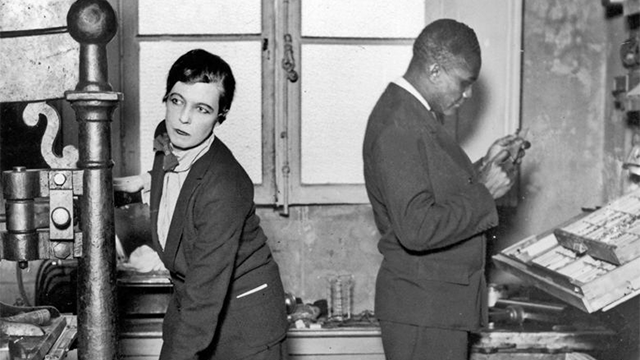Sunday, March 17, will be the Feast of Nancy Cunard, writer, heiress and political activist. Born 1896 into the British upper class, the only child of shipping magnate Sir Bache Cunard and American heiress Maud Burke, she devoted much of her life to fighting racism and fascism.
In 1928 she set up the Hours Press in Paris, aiming to support experimental poetry and provide a higher-paying market for young writers using her inherited wealth to take financial risks that other publishers could not. Among her own works published by Hours was an anthology of African-American literature entitled Negro. The Times Literary Supplement tells us:
The finished book – 866 pages long, quarto-sized, and weighing almost 4 kilograms – is something of a colossus. Its 155 contributors (two-thirds of whom were black) include some of the best-known names of the early twentieth century. Zora Neale Hurston, Theodore Dreiser, Langston Hughes, Ezra Pound, Louis Zukofsky and Nicolás Guillén (Cuba’s “national poet”) sit alongside leading black nationalists including George Padmore, Jomo Kenyatta and Nnamdi Azikiwe (the first President of Nigeria); contributions from the French Surrealists are translated by Beckett, and even the aesthete Harold Acton makes an appearance. Intended to record “the struggles and achievements, the persecutions and revolts against them, of the Negro peoples”, the anthology comprises one of the most comprehensive pre-Civil Rights era documents of transatlantic black history and culture. It also provides a primer of left-wing internationalism, anti-racism and anti-colonialism from the last years before the Popular Front against fascism eclipsed all other causes on the Left.
Christie’s notes:
The anthology featured her own detailed account of the 1931 Scottsboro Boys case, in which nine African American teens were falsely accused and wrongly convicted for the rapes of two white women in Alabama. A staunch defender of the Scottsboro Boys, Cunard founded the British Scottsboro Defense Fund in 1933 — whose members included Andre Gide, Rebecca West, Virginia Woolf and Aldous Huxley, among others — and organised demonstrations and a meeting at London’s Shoreditch Town Hall.
Wikipedia adds:
In the mid-1930s she took up the anti-fascist fight as well, writing about Mussolini’s annexation of Ethiopia and the Spanish Civil War. She predicted, accurately, that the “events in Spain were a prelude to another world war”. Her stories about the suffering of Spanish refugees became the basis for a fundraising appeal in the Manchester Guardian. Cunard herself helped deliver supplies and organize the relief effort, but poor health – caused in part by exhaustion and the conditions in the camps – forced her to return to Paris, where she stood on the streets collecting funds for the refugees
In memory of Nancy Cunard, here is the recipe for a treat she might have enjoyed in Paris.
Almond Macaroons
Ingredients
- 1 cup whole almonds (preferably blanched)
- ⅔ cup granulated sugar
- 1 large egg white
- ¼ teaspoon almond extract
- confectioners’ sugar for dusting
- about 16 whole almonds
Instructions
- Preheat oven to 350°F. and lightly butter a baking sheet.
- In a food processor pulse 1 cup almonds with granulated sugar until ground fine. Add egg white, almond extract, and a pinch salt and pulse until combined. Roll mixture into 16 balls, about 1 inch in diameter, and arrange about 2 inches apart on baking sheet. Slightly flatten balls and dust lightly with confectioners’ sugar. Gently press 1 almond into each cookie.
- Bake macaroons in middle of oven 10 minutes, or until pale golden. Transfer macaroons to a rack and cool completely. Macaroons keep 4 days in an airtight container at room temperature.
(Source: Epicurious)
Learn more about Nancy Cunard:

